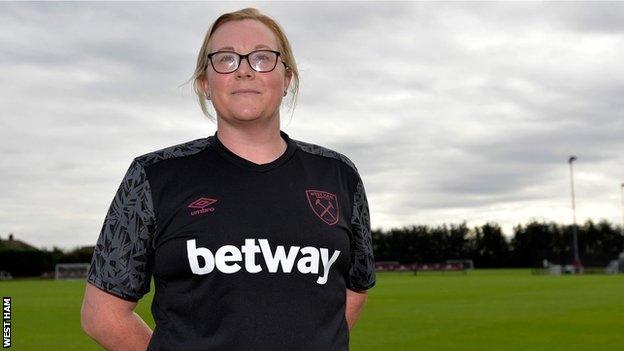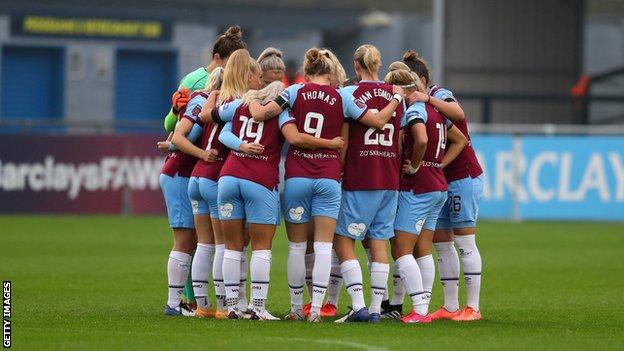West Ham women performance coach Jenny Coady on how she is helping the person behind the “superhero title” of professional athlete to flourish.

Jenny Coady – a performance coach at West Ham United women and with UK Coaching, where she works across 17 Olympic sports – speaks from experience.
Waterford-born Coady was an elite athlete herself, playing for Ireland as a guard in basketball.
Now her job is to help women deal with the pressures and expectations of life at the top of their chosen sport.
“As humans we all have issues, the different levels that you play at expose different issues,” she adds.
So how is Coady, someone whose own support while an athlete came from predominantly male coaches, helping the modern female sports star flourish?
‘Building on the brilliance that’s already there’
Coady, who travelled the world during her basketball career with Ireland, recognises the gap between the support she received as a female athlete at the top level and the support for male athletes.
“In my role I have been in a lot of male environments and they have so much – they may have six or seven people looking at player welfare to the one or none in women’s sport,” she added.
“But when you dig a little bit deeper my question is ‘are we using that one right?’ Are we using what’s there? We need to keep building on the brilliance that’s already there.”
Now herself part of the coaching process, the 38-year-old provides West Ham players with an outlet to share their struggles and concerns.
That might be addressing social media use, overcoming a bad training session or simply chatting in the canteen to relieve stress – and she works with other coaches to change the environment around players and in turn improve performances.
“The athletes have a multitude of things on their back – I hear first hand what the struggles are, what the concerns are,” she says.
“I get to join the dots, I have a helicopter view of what’s in place.”

‘I can be unapologetically me’
During her 12 years of playing at the top level, Coady recalls having 11 different coaches, only one of which was female, and believes that had an impact on her own initial approach to coaching.
“I had a role model who was a male so I then tried to coach like a male in my early days – it took me a while to understand ‘hang on, what can I bring to this scenario? I can bring me, I can be unapologetically me’.”
Mental health, particularly the mental health of female athletes, “wasn’t on the agenda” during her own experience as an elite athlete.
“We didn’t speak about how we were feeling when we were menstruating or when we had a bad day – you just left it outside the gym, you came in and played, you sometimes wore men’s kit and men’s gear,” she says.
“We just parked it.
“I want to keep a spotlight on mental health because if people are happy and they have nourishing environments, they’re going to thrive.”
‘Let’s be ambassadors for change’
Coady has noticed a “marginal shift” in the acceptance of women working in professional sport since her own playing career and sees “the opportunities that are there being valued a little bit more”.
Her own appointment at West Ham – which she says is “indicative of the opportunities that are being afforded to women’s sport” – coincided with the women’s team moving to a new state-of-the-art training centre at Chadwell Heathexternal-link, where the club are also looking to appoint a female coachexternal-link to work across the male youth teams as well as the women’s.
Coady hopes other women’s sports can recognise the benefits of investing in the mental health of their athletes, alongside modern facilities.
“Anything around people development with women means we can have more investment, more visibility, more campaigns and initiatives that support females feeling confident or having opportunities to enter into sport – so that we can be role models and that message can continue to grow,” she says.
“The investments are there by the big names, the sponsors are there, there’s an awareness from the sponsors that there is a spotlight on women’s sport at the moment.
“There are people out there who still want to say ‘this is wrong, that’s wrong’ but we’ve got to look forward and see that yes, these are small gains and yes we do want more.
“But celebrate where we’re at, drive forward, let’s be ambassadors for change – we want to be trailblazers and look at what the next step is.”
“There is lots in the pipeline but we need to keep going.”

